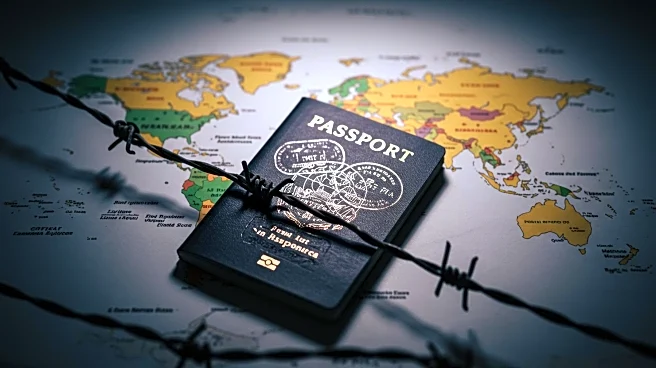What is the story about?
What's Happening?
Amine Ayoub, a Moroccan journalist and pro-Israel advocate, was detained for 32 hours in Cuba due to his pro-Israel activism. The incident occurred during a family trip when Cuban authorities questioned him about Israeli stamps in his passport. Ayoub, a Middle East Forum fellow, was traveling to meet his brother in the Bahamas and chose to transit through Cuba. Upon arrival in Havana, he was treated like a terrorist, held for several hours, and questioned about his Israeli visa stamps and connections to Israel. Despite having a valid Bahamian visa, Cuban authorities prevented him from leaving for the Bahamas, claiming the Bahamians did not want him. He was ordered to return to Morocco and held in a room with metal chairs for over 30 hours without food or water. Ayoub believes his detention was directly related to his pro-Israel activism, noting the lack of documentation during his detention.
Why It's Important?
The detention of Amine Ayoub highlights the challenges faced by pro-Israel activists in countries with strong anti-Israel stances. Cuba has maintained an anti-Israel position for decades, breaking diplomatic relations with Israel in 1973 and supporting the Palestine Liberation Organization. This incident underscores the risks associated with pro-Israel advocacy, particularly in regions where political tensions are high. It also reflects the broader geopolitical dynamics between Cuba and Israel, as well as the potential impact on individuals advocating for Israel. The situation raises concerns about freedom of expression and the treatment of activists in countries with opposing political views.
What's Next?
Ayoub's experience may deter other pro-Israel activists from traveling to countries with anti-Israel policies. It could also lead to increased scrutiny of travel routes and visa policies for activists. The incident may prompt discussions on diplomatic relations and the treatment of foreign nationals based on political affiliations. Ayoub's warning about the dangers of pro-Israel work suggests potential challenges for activists in other countries with similar stances. The Cuban government's lack of public comment on the incident leaves room for speculation about future diplomatic interactions.
Beyond the Headlines
The detention of Ayoub reflects deeper geopolitical tensions and the complexities of international advocacy. It highlights the ethical and legal challenges faced by activists in navigating political landscapes. The incident may influence public opinion and diplomatic strategies, particularly in Morocco, where pro-Palestinian sentiment is strong. It also raises questions about the balance between personal advocacy and national interests, as well as the role of international diplomacy in protecting activists.
















